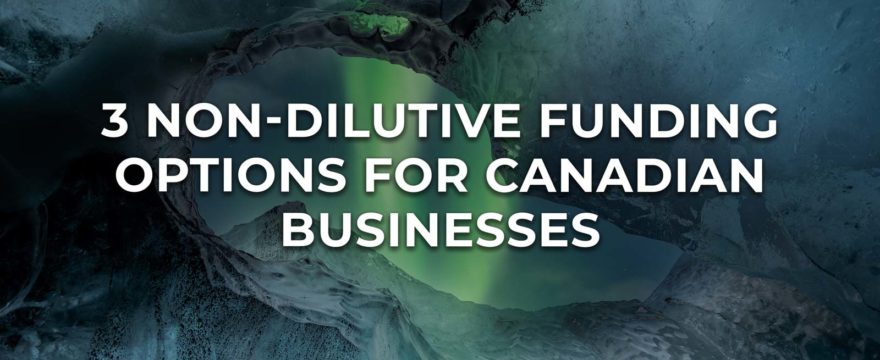
Organizations in need of money to pay for projects have several options. For instance, they may seek support from venture capitalists, angel investors, and other similarly dilutive funding opportunities. The downside to this financial support is that it requires companies to share some ownership with the investor. Choosing dilutive funding may mean surrendering some of your future profits and losing some control over operations.
A less sacrificial alternative to dilutive funding is non-dilutive funding. This financing does not force businesses to relinquish ownership to obtain capital. In Canada, non-dilutive funding manifests in multiple opportunities. Learn more about some of the different non-dilutive funding options to determine if your innovative business is eligible for financial support.
Scientific Research and Experimental Development (SR&ED)
The SR&ED tax incentive program is the largest source of government-funded financial support for research and development (R&D) in Canada. It serves businesses of all capacities across various industries, from Canadian-controlled private corporations (CCPCs) to small enterprises to individuals and trusts. The program’s primary objective is to encourage pioneering Canadian organizations to conduct R&D in the country.
Companies that conduct work that qualifies for SR&ED incentives receive either a deduction against their income or a refundable or non-refundable investment tax credit (ITC), depending on their business type and size. Activities must meet the following two criteria to be eligible for this government incentive:
- Created with an end goal of realizing a technological advancement or furthering scientific knowledge
- Designed as a systematic investigation or exploration into a field of science or technology using analysis or experimentation
The specific work that qualifies for SR&ED tax credits is basic research, applied research, and experimental development. Efforts that directly support these three categories, such as engineering or data collection tied exclusively to the project, are also eligible.
Federal Government Grants
Besides the SR&ED tax incentive program, the Government of Canada offers a host of grants, as well. Federal grant financing opportunities vary widely in their amounts, eligibility requirements, and conditions. Some are reserved for a specific type of organization, like non-profits or small businesses, while others are focused on achieving a particular goal, such as advancing science and technology or creating more jobs. The overall purpose of these grants is to support the growth of companies that adhere to government mandates.
A well-known federal grant is the National Research Council of Canada Industrial Research Assistance Program (NRC IRAP) Project Grant. The foremost initiative for supporting innovation in small and medium-sized businesses, IRAP delivers funding, advisory services, and connections to increase forward-thinking capabilities and help commercialize ideas.
To qualify for funding from IRAP, a small or medium-sized enterprise must be an incorporated organization in Canada with the goal of making profits. It also needs to have 500 full-time equivalent employees or less. Another significant stipulation is that the business must be focused on growth and generating income by creating and marketing innovative and technology-driven products, services, and processes in the country.
Province-Level Grants
Most federal grants are open to businesses in every Canadian province and territory. However, provincial governments also extend funding options to companies operating within their regions. Not all provinces have the same amount or types of organizations, meaning the availability of funding programs and the activities they support may differ depending on the area.
Consider Canada Economic Development for Quebec Regions (CED). This program works to provide funding and support for small to medium-size businesses and economic non-profit groups in all areas of Quebec. Most of the funding the CED offers comes from the following three programs, each of which has distinct eligibility guidelines:
- Community Futures Program (CFP)
- Quebec Economic Development Program (QEDP)
- Regional Economic Growth through Innovation (REGI)
Receive Non-Dilutive Funding From Easly
If your business receives SR&ED tax credits, you may be able to accelerate your funding timelines with Easly. We serve innovative companies that acquire grants and tax credit refunds by bringing those funds forward and into the bank accounts of qualified Canadian organizations.
We also provide resources to assist companies in figuring out how much they will receive in Easly Advances or government refunds. For instance, our SR&ED calculator enables you to determine an estimated tax credit refund amount, while our Easly calculator reveals the anticipated value of the Advances you could obtain in two weeks or less.
Contact us today to learn more about non-dilutive funding options and our services.
.png)
.png)
.png)
